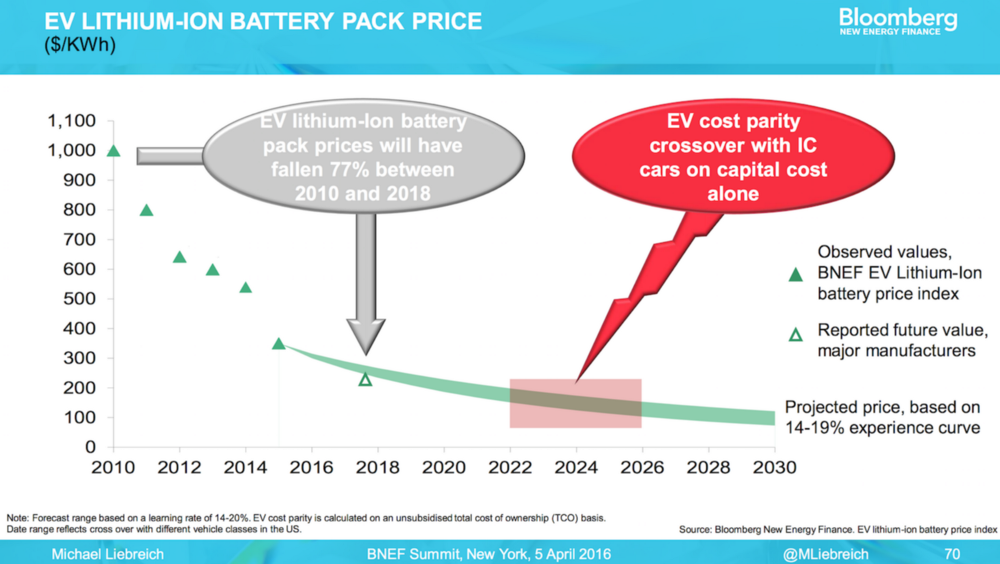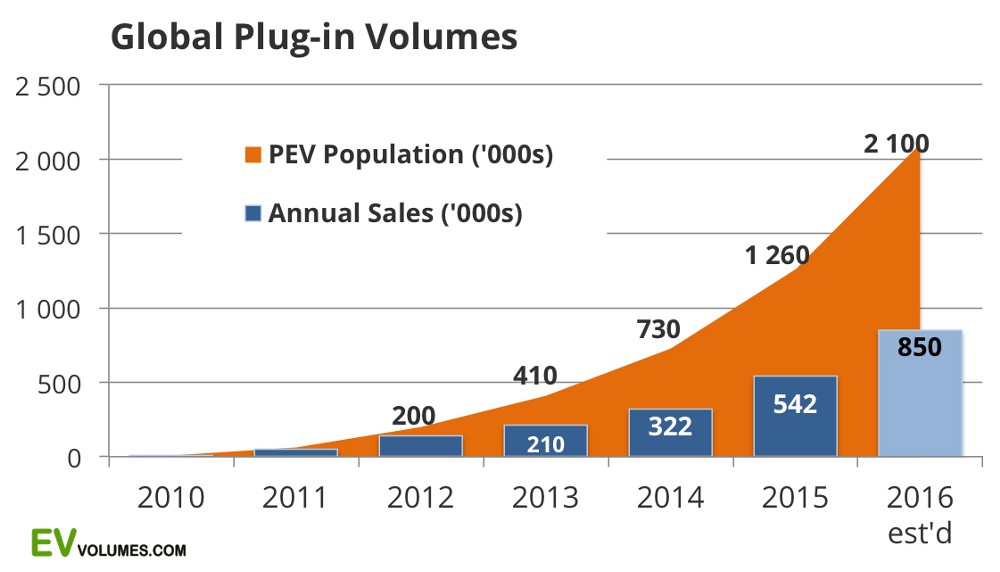You know the electric vehicle (EV) revolution is at a tipping point when German legislators of both parties vote for a resolution to ban the internal combustion engine (ICE) by 2030.
After all, Germans invented the first practical motorcar and the diesel engine. They’re such a car-loving culture that large stretches of their autobahns have no speed limit. Of course, the best new electric cars already accelerate much faster than ICE cars — so they are the ultimate driving machine if you have the need for speed. They also have a range greater than 300 miles.
While improving performance, EVs happen to be coming down in price at a rapid pace, as this Bloomberg New Energy Finance chart shows:

At the same time, EVs are much cheaper to maintain and fuel (per mile of travel) than ICE cars. The result, as the lead author of a new GTM research report on EVs explains, is that, “A price and energy cost analysis of conventional, hybrid, and electric vehicles illustrates that the EV has the lowest lifetime cost, even in a low-oil-price environment.”
And with solar and wind power prices dropping just as fast as car batteries, EVs lap the competition as the cornerstone climate solution in the transportation sector. This matters even more now that the world has unanimously embraced the Paris Climate Agreement, which requires leaving most of the world’s fossil fuels unburned.
The result is that more and more companies and countries across the globe are figuring out that the future of ground transport — especially urban transport — is electric. Indeed, as the Guardian reported this month, “Every new or refurbished house in Europe will need to be equipped with an electric vehicle recharging point, under a draft EU directive expected to come into effect by 2019.”

The leading national contender to go gasoline- and diesel-free is Norway, where plug-in hybrids and all-electric are taking over the new car market the most rapidly. This year, a remarkable one in three new passenger cars sold in Norway was electric.
In June, Norwegian media reported that four of the country’s major parties have reached an agreement to ban the sale of new gasoline- and diesel-powered cars starting in 2025.
Just heard that Norway will ban new sales of fuel cars in 2025. What an amazingly awesome country. You guys rock!! pic.twitter.com/uAXuBkDYuR
— Elon Musk (@elonmusk) June 3, 2016
What’s even more remarkable about this is that Norway is of the largest producer of petroleum in Europe. Fossil fuels comprise 45 percent of Norway’s exports and 20 percent of its GDP. As Fortune puts it, Norway’s plan is “the geopolitical equivalent of a drug dealer that refuses to touch their own product.”
Dutch lawmakers have also begun the process of instituting a ban on fuel-burning cars by 2025. In the Netherlands, electric cars have a 10 percent market share. One Dutch start-up is offering access to an EV with a 250-mile range and top speed of 92 mph with a $37 a week subscription. Oh — and the car can go from zero to 60 in 7 seconds.
As noted above, Germany’s Bundesrat (senate) passed a resolution that would ban ICE cars as soon as 2030. A resolution is far from law, but as Forbes noted earlier this month, “the EU auto industry seems to be ready to switch to electric power, and politicians just signaled their willingness to force the switch to zero-emission, if necessary.” Germany recently put in place a €4,000 ($4,383)-incentive for EV purchases to accelerate the process.
India has also announced its intention to be a “100 percent electric vehicle nation” by 2030. “India can become the first country of its size which will run 100 percent [of]f electric vehicles,” Power Minister Piyush Goya said earlier this year. The country wants to make the program “self-financing,” he said, something that could work without “one rupee support from the government.”
Goya then made some astonishing remarks about the EV effort: “Can we actually give electric car for free (zero down payment), and people can pay for that out of the savings on the petroleum products. Innovation is possible, it just needs an open mind.”
This idea may seem unimaginable today, but not too long ago similar no-money-down deals were unimaginable for solar panels — and those deals have gone on to revolutionize and transform the solar industry.
And then there’s China. While the government hasn’t made any pledges to go all-electric by a certain year, China is already the largest market in the world for EVs. The government is aiming for a 10-fold increase in sales by 2025, offering subsidies up to 60 percent of an EV’s cost.
